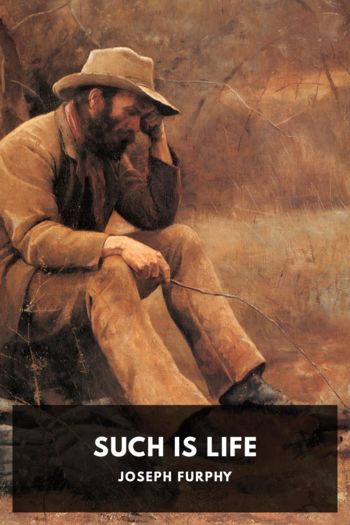Such Is Life, Joseph Furphy [online e book reading txt] 📗

- Author: Joseph Furphy
Book online «Such Is Life, Joseph Furphy [online e book reading txt] 📗». Author Joseph Furphy
Slackening speed now and then to cross creeks and rough places, I found myself following a pad, and noticed the fresh tracks of the bullocks, mile after mile. At last I heard across the lignum the jangle of a brass bell, and the plock, plock of an iron frog, and presently my quarry appeared in sight a couple of hundred yards ahead.
To do the boundary-rider justice, he was driving the cattle quietly and considerately. He looked round on hearing the clatter of horse’s feet, but my Mazeppa aspect seemed neither to surprise nor disconcert him. He wasn’t altogether a stranger to me. For several years I had known him by sight as a solid, phlegmatic man, on a solid, phlegmatic cob; and I suppose he had his own crude estimate of me, though we had never had occasion to exchange civilities.
But now, after a five miles’ chase, the sight of the man acted on my moral nature as vinegar is erroneously supposed to act on nitre. I reined-up beside him. The Irresistible was about to encounter the Immovable; and, even in the excitement of the time, I awaited the result with scientific interest. When a collision of this kind takes place, it sometimes happens that the Irresistible bounces off in a more or less damaged state; at other times, the Immovable is scattered to the four winds of heaven in the form of scrap, while the Irresistible, slightly checked, perhaps, in speed, sails on its way. But you can never tell.
“Where are you taking these bullocks?” I demanded in a tone which, I am sorry to say, reflected as little credit on my politeness as on my philosophy.
“Steation yaads,” he replied indifferently, and with a strong English accent.
“Did you take them off purchased land?” I asked, eyeing him keenly.
“Oi teuk ’e (animals) horf of ’e run,” he remarked, rather than replied, without condescending to look at me.
“Do you know what day this is?” I inquired magisterially.
“Zabbath,” he replied kindly.
“And do you know there’s a new act passed—‘Parkes’s Act,’ they call it—that makes the removing of working-bullocks from pastoral leasehold, on Sundays, a misdemeanour, punishable by a term of imprisonment not exceeding twelve months, with or without hard labour?”
“Granny!” he remarked.
Driven back in disorder, I hurried up my second line.—
“Do you know who these bullocks belong to?” I inquired ominously.
Something akin to a smile flickered round the shaven lips of the descendant of Hengist as, contemplating the lop ears of his horse, he observedly contentedly,
“Ees, shure; an’ ’hat’s f’r w’y Oi be a-teakin’ of ’em.”
“Well, Alf’s laid-up; not able to look after them—”
“Oi’ve ’eard ’at yaan afoor.”
“—so I’ve come to take them back, and leave them at his camp on Mondunbarra.”
“Horrite. Oi wants wun-an’-twenty bob horf o’ you afoor ’em (bullocks) tehns reaoun’.”
“Will you have it now, or wait till you get it?” I asked, betrayed by the annoyance of the moment into a species of vulgarity unbecoming an officer and gentleman. “I don’t mind paying you the money, provided it clears the bullocks for the future—not otherwise. In the meantime I’m going to take them back-pay or no pay.”
“Be ’e a-gwean to resky ’em?” he inquired, slightly reining his hippopotamus, and looking me frankly in the face, whilst an almost merry twinkle animated his small blue eyes.
“By no means,” I replied suavely; and we rode together for a few minutes in silence.
I had wakened the wrong man. The Immovable had scored, simply because he was a person of one idea, and that idea panoplied in impenetrable ignorance. A compound idea, by the way: namely, that Alf’s bullocks were going to the station yards, and that he, Fitz-Hengist, was taking them there. All this was apparent to me as I regarded him out of the comer of my eye.
“Foak bean’t a-gwean ter walk on hutheh foak,” he remarked calmly.
“A gentleman against the world for bullheadedness,” I sneered, aiming, in desperation, at the heel by which mother Nature had held him during his baptism in the thick, slab bath of undiluted oxy-obstinacy (scientific symbol, Jn Bl).
“Hordehs is hordehs,” he argued, as the good arrow-point penetrated his epidermis, fair in the vulnerable spot.
I laughed contemptuously. “Fat lot you care for orders! A man in your position talking about orders! Get out!”
“Wot’s a (person) to diew?” The point was forcing its way through the sensitive second-skin, or cutis.
“Do!” I repeated, with increasing scorn. “Strikes me, you can do pretty well as you like on this station.”
“Bean’t Oi a-diewin’ my diewty?” he asked in wavering expostulation—the point now settling in the vascular tissues.
“It’s in the blood, right enough,” I retorted, with insolent frankness, and still regarding him out of the comer of my eye. “I believe you’re Viscount Canterbury’s brother, on the wrong side of the blanket.”
“Keep ’e tempeh; keep ’e tempeh,” said he deprecatingly, as the poison filtered through his system. “Zpeak ’e moind feear atwixt man an’ man. Bean’t Oi a-diewin’ wot Oi be a-peead f’r diewin’? Coomh!”
“Well,





Comments (0)